When I first arrived in Japan, I had no idea how much ‘Business Hotels in Japan’ would become a part of my travel and work vernacular. When I thought of business hotels, I pictured a lone businessman in a small, dark, seedy room. Surely a Japanese business hotel was just like a capsule hotel, only bigger, right?
Nope. Not right.
I remember first properly hearing the term in my early twenties. I’d finally found a steady group of Japanese girlfriends. Being one of the only foreigners in the city, this was a girl group cohort that I was so proud of.
It had taken me a reasonable amount of time to not only find ‘my people’ but also to reach a conversational level of Japanese where I could actively participate in most girlie chats over chu-hais (alcoholic drinks with soft drink mixers) and umeshu (plum wine.) The group no longer needed to stop the conversation just for me!
So you can imagine my delight when I was invited on a girls’ trip for two nights in a city – just a few hours away. Being young (and **cough cough** poor!), my first question was where we would stay. “Oh, we will just grab a bi-ji-ho for all of us,” exclaimed my friend, Ayako, “and we will each just bring lots of canned drinks and snacks to share in our rooms after dinner.”
I soon learned that bijiho was a shortened way to say ‘business hotel’ (pronounced bijinesu hoteru), which is how that “ji” sound has worked its way into the shortened version.
To my delight, the girls went on to list their favourite Japanese business hotel brands in the same way that I’d expect them to prioritize their favourite fast food chains.
What are Business Hotels?
As the name suggests, business hotels were initially designed for business travellers. They were a comfortable and affordable option for business people staying for a short time (usually one night) in a city away from home.
The Japanese business hotel model has always been to appease the very short-term traveller who simply needs to lay their head. The prices were also to appeal to the company’s strict travel allowance budget.
The business hotels were designed to be clean and simple, containing a bed with a small desk, a tiny refrigerator, a TV and a tiny ensuite.
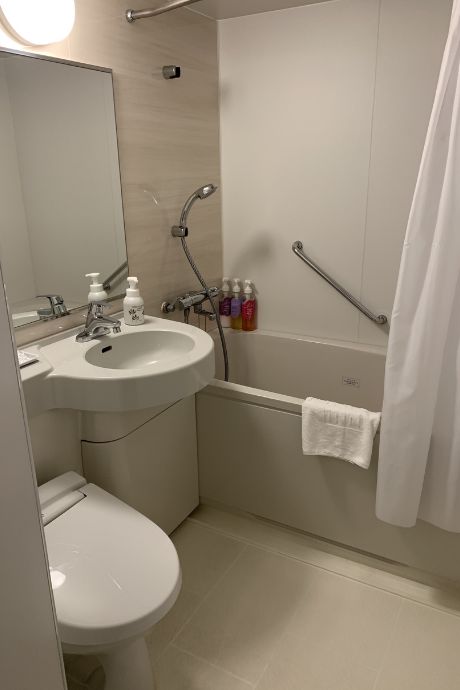
These hotels were never meant to be the kind of place that would offer such luxuries as room service. However, nowadays, it is typical for business hotels in Japan to have a simple breakfast buffet restaurant option or a simple ‘morning set’, which includes coffee and a piece of toast.
Business hotels are usually located in built-up areas close to major stations – convenient for travellers. Their location makes even more sense if you’ve ever worked for a Japanese company. You travel for business, share a meal with the client or colleagues from that branch of your organization and then fall into bed. Then, wake early, check out and keep on moving.
Those who check in late at night can use in-house vending machines for cup noodles, beers and soft drinks.
Nowadays, business hotels in Japan (and Tokyo, especially) have held on to the same fundamentals of being an affordable, reliable and convenient accommodation style. But they have also developed and evolved to appeal to young travellers, couples on a budget, girl’s trips and even family travel.

Evolution of Business Hotels
The first Japanese business hotel was built in Kyoto in 1920, and the model worked so well that other business hotel brands also soon sprung up in Tokyo and Osaka. Before long, business hotels were in most Japanese cities nationwide, becoming extremely popular in the 1960s.
In the 1970s, some large business hotel chains expanded their facility options to include conference rooms and large dining halls for meetings and company functions. Then, at the height of the bubble economy in the 1980s, these Japanese business hotels began to morph into what was referred to in Japan as ‘City Hotels.’
City Hotels were a more luxurious version of their business hotel counterpart. They included wedding venue options and one or more in-house restaurants.
Some of these ‘city hotels’ still remain today – with brands such as the ‘*insert city name* Prince Hotel’ or ‘The Grand Nikko *insert city name*’. City Hotels are likelier to have facilities such as a fitness club, a spa for facials and massages, etc. They also have large rooms that can accommodate more than just two people.
However, once the Japanese economy took a nose-dive not long after, so did the demand for a ‘nicer place to stay.’ Tour groups, who had also started filling up a significant number of rooms per night, had also decreased significantly and had mostly stopped coming. So, the business hotel model evolved again.
This time, business hotel developers and owners started providing rooms based on the average ‘per night’ budget companies set aside for their employees. The average range in the 1990s was around 6000 yen per night.
Even today, a basic business hotel outside the major cities only costs 2000 – 3000 yen more than the 1990s rate. Meanwhile, business hotel rates in major cities are now closer to the 10,000 yen price point.
However, many different types of business hotels now cater to different budgets, including those who want a more luxurious version or a wacky or unique option (which I’ll discuss in more detail below.)
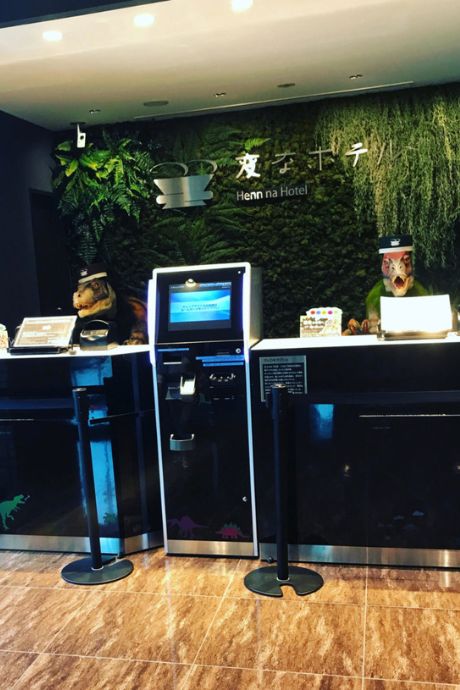
How are Business Hotels Different from Western-style hotels
So, for those who have only ever stayed in Western-style hotels, how do you break down the differences between a Japanese business hotel and a Western-style hotel? Let me try to make the main differences clear with bullet points.
Western hotels in Japan
- More space in the room for in-room relaxation, such as a sofa or space to open up a full suitcase without having to make use of the bed
- Options such as in-room dining are more common, as are other in-house facilities like gyms, pools, concierge services and assistance with carrying bags to rooms. There are also options like in-room movie options *for an additional fee* or massage services, etc.
- Guests can expect higher customer service, such as assistance with restaurant reservations and detailed sight-seeing assistance.
- They are located a little further from major transport hubs (as more space is required for the venue to make bigger rooms for guests.
- It is designed for guests who enjoy spending a portion of their holiday at their hotel accommodation.
- They have branded amenities such as soap, shampoo, conditioner, razor, etc.
- Western-style hotels have a broader selection of breakfast options with several different types of cuisine.
- Staff at Western hotels in Japan generally speak at least a basic level of English.
- They are one of Japan’s more expensive accommodation options (the starting rate is usually 11,000 yen + per night).
Business hotels in Japan
- They have small hotel rooms with a bed and often just enough room to walk around the bed, and that’s about it.
- Business hotels are designed for guests who enjoy getting out and about and who use their hotel room mainly as a place to sleep.
- They are set up for guests to arrive full-handed. Pyjamas, toothbrush and toothpaste, soaps, shampoo, conditioner, razor, and bath salts are provided. They may also offer pyjamas and slippers for in-house use.
- Business hotels are typically located close to major train stations or in major business districts.
- Vending machines with drinks and sometimes instant noodles are found on most floors of business hotels.
- Some business hotels in Japan now have a small coin laundry for guests to use.
- They commonly offer a simple breakfast for 500-1500 yen, which is often something like salad, rice, bread, cereal and tinned fruit, tea and coffee.
- Business hotels in Japan are a very affordable style of accommodation (ranging from 6000-10,000 yen per night.) Costs are kept low to keep the workers of large Japanese organizations returning for business trips.
- Business hotel brands are reliable. For example, if you’ve stayed in a Daiwa Roynet Business Hotel in Nagoya, you can expect very similar rooms and room amenities when you stay with the same brand in Osaka.
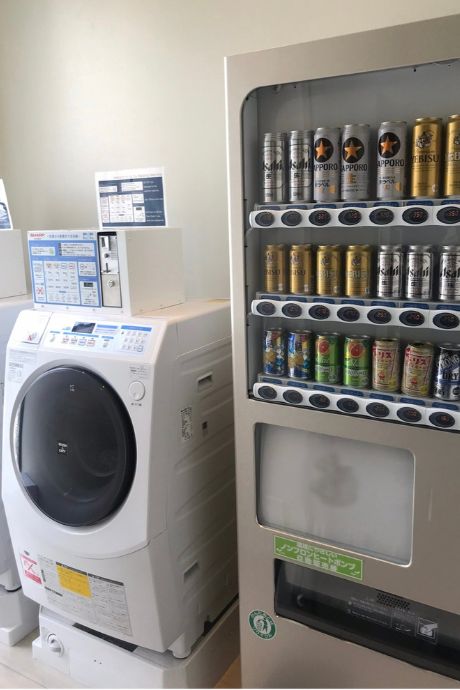
Key Features of a Business Hotel Experience
A business hotel lobby set-up is simple, and the guest check-in experience is efficient.
It is now quite common for amenities to be stored near the main front desk, and guests can return to grab what they need as they need it. My children love to try all the bath salt ‘flavours’ one by one!
The rooms are simple (often with very little space around the bed, although there is usually a small desk and a television.)
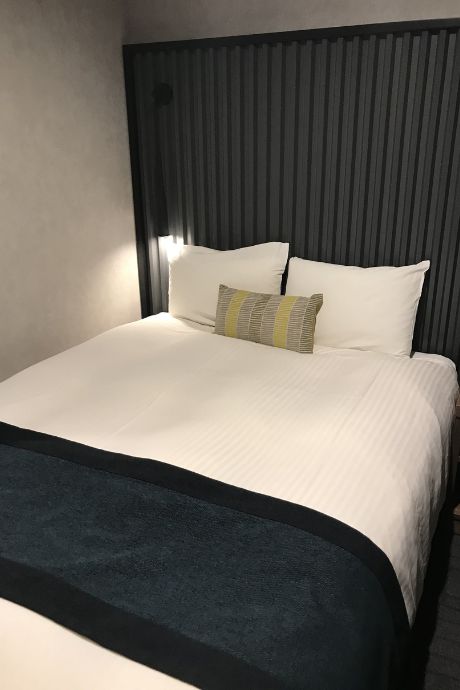
The ensuite is a similar all-inclusive unit-style bathroom. This kind of bathroom is also widespread in Japanese residential high-rise apartments. The unit contains a toilet, a small sink and a bath with a shower option above the tub. Business hotels in Japan also provide a pull-out washing line to hang wet clothing if required.
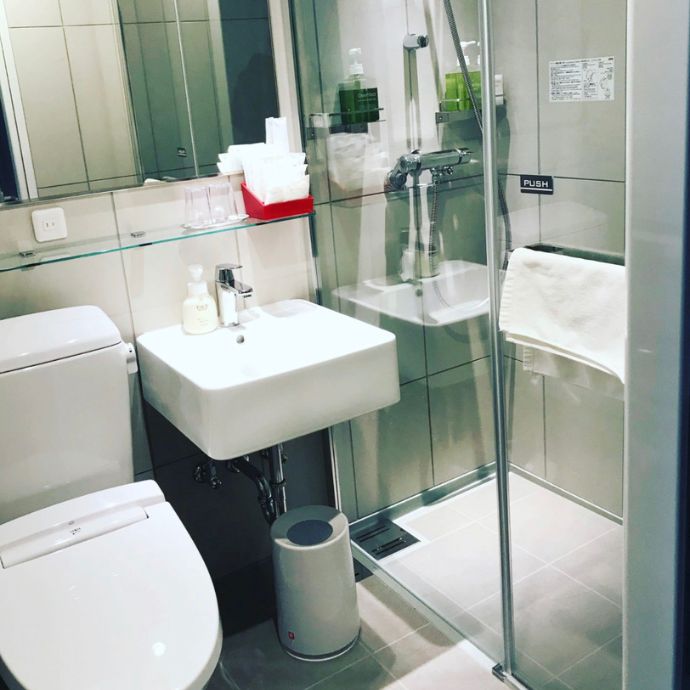
Hotels that provide breakfast often have a breakfast on the ground or top floor. Breakfast is almost always buffet style with set hours, for example, 7 am – 9:30 am.
It is more common now for business hotels in Japan to have an on-site coin laundry for guests to use. These machines take 100 yen coins and often have in-built laundry liquid dispensers.
Vending machines can usually be found on each floor – usually selling water, soft drinks and sometimes beer and a type of alcoholic mixed drink (a lemon ‘chuhai’ seems to be the standard.)
Business hotels offer wifi to their guests, but there is rarely a lobby or lounge area. It is assumed that any work will be done inside the guest’s room.
Main Business Hotel Chains in Japan
When I think of Japanese business hotel chains in Japan, the first brands that come to mind are:
- Daiwa Roynet
- Sotetsu Fresa Inn
- Dormy Inn
- APA Hotels
- Toyoko Inn
- Richmond Hotels
- Vessel Hotels
- The B hotels
- Sun Plaza Hotels
Cheaper business hotel chains in Japan
The cheaper business hotel chains in Japan include:
- Toyoko Inn
- The Knot
- Sotetsu Fresa Inn
- Apa Hotels
- Dormy Inn
- Hotel Route Inn
- Super Hotels
- Comfort Hotels
- Via Inn Hotels
- R & B Hotels
- Hotel Livemax
- Tokyu Rei Hotels
- Smile Hotels
- A-1 Hotels
Slightly higher-end business hotel chains in Japan
The slightly higher-end business hotel chains include:
- Washington Hotels
- Hotel Villa Fontaine
- Tokyu Stay Hotels
- Richmond Hotels
- Sunroute Hotels
Where to find Business hotels?
You can find business hotels near train stations or highway interchanges in most cities.
How to Book Business Hotels
Business hotels are most commonly booked online via third-party travel sites such as Booking.com, Agoda, Expedia, Hotels.com or Rakuten Travel. This is mainly because business hotels are often used for large tour groups, so many rooms need to be booked at the same time.
An average business hotel per night rate is between 6,000 and 10,000 yen. Prices go up slightly for national holidays and long weekends. Guests can also expect to pay a slightly higher amount if their stay includes breakfast.
What to expect when checking into a business hotel in Japan?
Staff at the hotel will ask guests for their booking details and photo ID. A credit card is usually required to make a small security deposit, which will be refunded upon checkout (this step is unnecessary if guests have made the original hotel reservation using a credit card).
Many business hotels are also adopting a self-check-in reception instead, which is all done via a screen in the hotel lobby.
Guests will then be given a key or card key and instructions on where to find their room. If amenities such as a toothbrush are stored in the lobby, guests will be shown where they can help themselves. They will be told the breakfast hours if the hotel stay includes breakfast.
New Versions of Business Hotels in Japan
The business hotel model is in demand for a reason – it works, it’s cost-effective, and it’s convenient. So many types of hotels use a similar model but add some unique elements or additional facilities or experiences to their brand. These extra elements appeal to female clientele or companies who want to reward their staff members with a more luxurious stay.
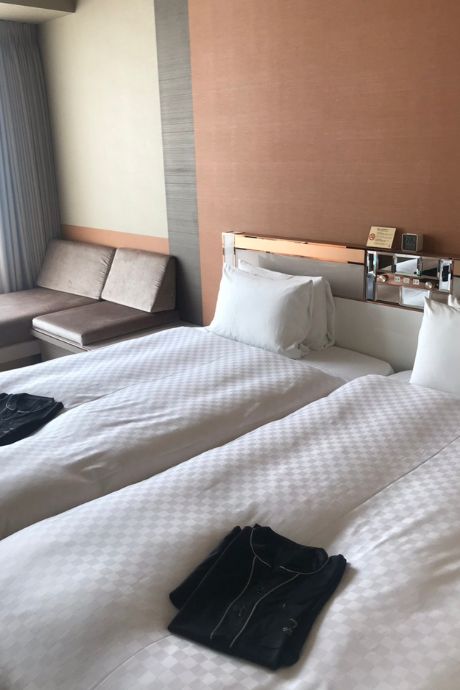
Even the choice of linen colours or breakfast choices has changed in many hotels to ensure that female guests are more likely to return to a particular business hotel.
Some examples of this are:
- Trunk Hotel is a very high-end hotel in Shibuya, just on the skirts of Harajuku, with mostly single and some double occupancy rooms. This eco-hotel has been built with upcycled walls of Japanese traditional homes. The hotel design is sleek, and the cost is definitely higher (38,000+ yen per night), but the amenities are all high-end brands and well-known chefs design the hotel menus. The bar in the lobby also gives off New York City vibes and is open to the general public. So, with this stay comes status and luxury.
- Candeo Hotels are a business hotel chain designed mostly with tour groups in mind, but every branch has its own public rooftop bath (separated by gender) for guests to enjoy.
- The Knot Hotels are a business hotel brand designed with international guests in mind. The rooms are small, but the lobby and restaurant are set up in a way that helps guest mingle and treat it as their own lounge room or ‘home away from home.’
- Henn Na Hotels (Henn Na Hotel translates to “strange hotel”) is another business hotel that has decided to lean on the wacky Japan factor. The lobby is self-check-in, except androids or animatronic dinosaurs staff it.
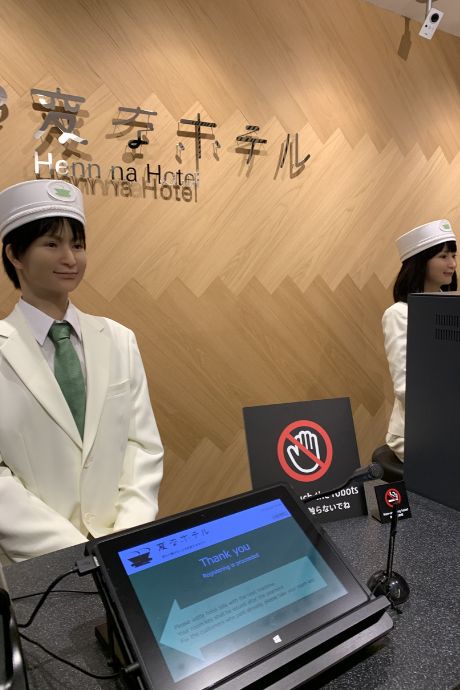
Services and Facilities at Business Hotels in Japan
As mentioned above, some business hotels in Japan include vending machines, a coin laundry room, wifi and some business hotels (such as the Dormy Inn chain) have a small onsen or public outdoor bath for guest use.
Etiquette in Business Hotels
Etiquette in Japanese business hotels is similar to general Japanese hotel etiquette (or Japanese apartment living, for that matter.)
Expectations are that guests are as quiet as can be and shouldn’t congregate in corridors or disturb other guests. Guests are to keep any common areas clean.
Also, in-room slippers are only used in the guest’s room. Put shoes on outside the room; bare feet in the lobby is a big, big no-no). Provided pyjamas are also only to be used in the room.
My Final Thoughts about Business Hotels in Japan
Hotels are an economical way to travel in Japan, and my favourite part is just how reliable a particular brand can be. If expectations are met (or exceeded) at one location, then I can be sure that my next stay elsewhere, with the same hotel brand, will be of a similar quality.
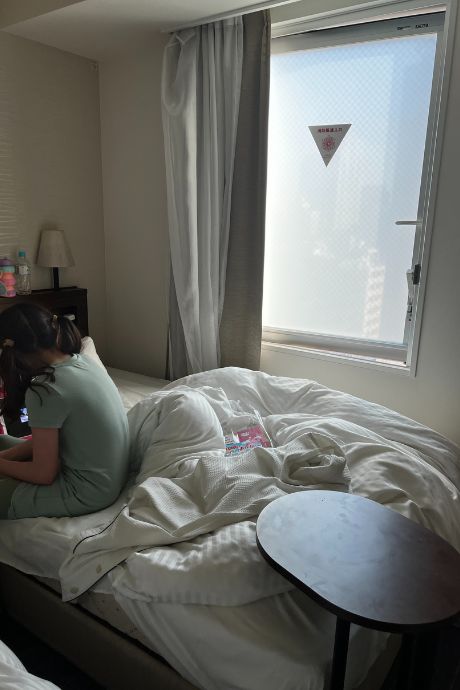
Frequently Asked Questions about Business Hotels in Japan
Here are my answers to some of the most commonly asked questions about business hotels in Japan.
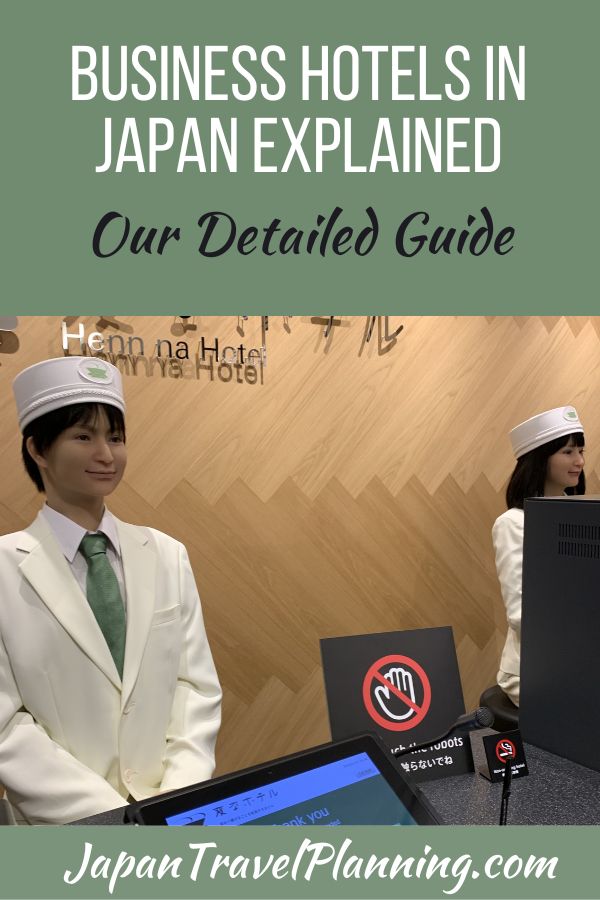
Join the Japan Travel Planning Facebook Group or Discord Server
You are also welcome to join our Japan Travel Planning Facebook Group and our Japan Travel Planning Discord Server – they are great resources to enable you to ask questions about your upcoming trip to Japan!
Disclaimer: This article contains affiliate links. If you book after clicking on one of these links then we may receive a small commission at no extra cost to you.

